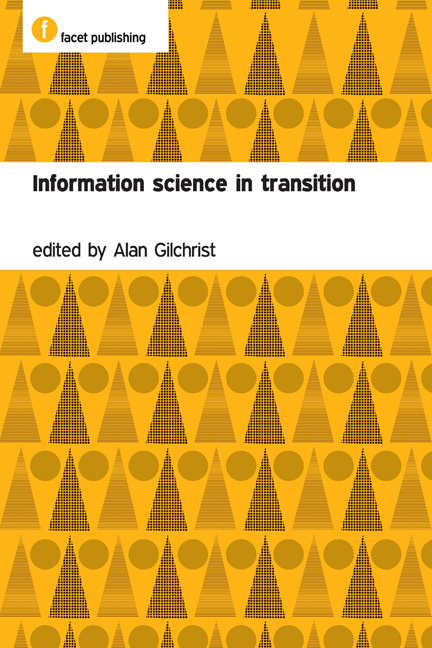Book contents
- Frontmatter
- Contents
- Contributors
- Preface
- Editorial
- Guest Editorial: Meeting the challenge
- 1 Fifty years of UK research in information science
- 2 Smoother pebbles and the shoulders of giants: the developing foundations of information science
- 3 The last 50 years of knowledge organization: a journey through my personal archives
- 4 On the history of evaluation in IR
- 5 The information user: past, present and future
- 6 The sociological turn in information science
- 7 From chemical documentation to chemoinformatics: 50 years of chemical information science
- 8 Health informatics: current issues and challenges
- 9 Social informatics and sociotechnical research – a view from the UK
- 10 The evolution of visual information retrieval
- 11 Information policies: yesterday, today, tomorrow
- 12 The disparity in professional qualifications and progress in information handling: a European perspective
- 13 Electronic scholarly publishing and Open Access
- 14 Social software: fun and games, or business tools?
- 15 Bibliometrics to webometrics
- 16 How I learned to love the Brits
- Index
9 - Social informatics and sociotechnical research – a view from the UK
Published online by Cambridge University Press: 08 June 2018
- Frontmatter
- Contents
- Contributors
- Preface
- Editorial
- Guest Editorial: Meeting the challenge
- 1 Fifty years of UK research in information science
- 2 Smoother pebbles and the shoulders of giants: the developing foundations of information science
- 3 The last 50 years of knowledge organization: a journey through my personal archives
- 4 On the history of evaluation in IR
- 5 The information user: past, present and future
- 6 The sociological turn in information science
- 7 From chemical documentation to chemoinformatics: 50 years of chemical information science
- 8 Health informatics: current issues and challenges
- 9 Social informatics and sociotechnical research – a view from the UK
- 10 The evolution of visual information retrieval
- 11 Information policies: yesterday, today, tomorrow
- 12 The disparity in professional qualifications and progress in information handling: a European perspective
- 13 Electronic scholarly publishing and Open Access
- 14 Social software: fun and games, or business tools?
- 15 Bibliometrics to webometrics
- 16 How I learned to love the Brits
- Index
Summary
Abstract
This paper explores the connections between two historical lines of research: social informatics in the United States, and sociotechnical studies in the United Kingdom. The author discusses samples of work from three long established UK research sites, at Manchester, Edinburgh and the London School of Economics, to give the reader a sense of sociotechnical work at different historical periods. Though the US and UK traditions share a common interest in the production of technology, and work with complementary concepts and methods, formal links between the two have not been strong for much of the historical period under review. However, there are signs of fusion in the work of a current generation of researchers on both sides of the Atlantic.
Introduction
Social Informatics is concerned with computerization, or the
transformation in human activity that follows the implementation, use and adoption of computers in different types of organization [1].
Historically, separate disciplines have explored this phenomenon from perspectives that focus on different stages of technological development: Human Computer Interaction has handled interface design and ergonomics; Information Systems has addressed analysis, design and implementation; LIS (Library and Information Science) has addressed information retrieval and use; Business and Management have addressed adoption and impact; Operations Research has modelled processes. Social Informatics (SI), in contrast, is transdisciplinary, tracing antecedents and consequences across these different phases of development, and treating technology as an evolving assemblage of interests, activities and artefacts that is shaped over time in local conditions.
The US tradition
In the United States, an explicit SI line of thinking was first articulated in the early 1970s by an eclectic group of analysts working at the University of California, Irvine, exploring information systems in local government across the US. Perplexed by the mismatch between accounts from engineering, managerial and operating staff of the impact of ICTs on organization, Kling and Scacchi [2] produced an explanatory frame, the ‘web of computing’, in a seminal paper that was in effect a manifesto for a new line of inquiry.
- Type
- Chapter
- Information
- Information Science in Transition , pp. 199 - 220Publisher: FacetPrint publication year: 2009



